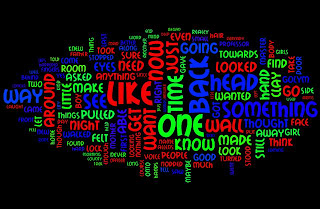November and the Art of Shitty First Drafts
Last night I completed my 50,000th word on my NaNoWriMo project - a yet to be titled urban fantasy. A lot of people would be jumping up and down at this point, but I'm keeping myself reserved for two big reasons: 1) I have at least 20,000 more words to go and 2) I know this is only the shitty first draft.
"But Alicia," you're thinking, "you're being too hard on yourself."
Believe me - I'm not.
A shitty first draft is a novel's right of passage. That initial version that you started on the diner napkin? Shitty first draft. The paragraph from a writing exercise? Shitty first draft. The one that your dog dragged it's ass on? Shitty. First. Draft.
Author Anne Lamott has a whole chapter dedicated to this in her book, Bird by Bird. (You haven't read it yet? Pick it up. Now.) In the chapter, she says:
"Seriously, Alicia," you're now thinking. "Stop with the bullshit. My novel's FILLED with spontaneity."
Maybe. Did you have to fight for it? I know that I had to on my edit-as-I-go writing projects. This one, I haven't had a fight yet. Through this more free version of Writer Alicia, I've been able to learn more about how my antagonist works and how my protagonist is rather two dimensional.
Even if I deluded myself that I somehow came out with a ready to go piece, a few little tools pointed out that I am so not. These tools are the Word Frequency Counter and, of course, Wordle. Both of these have shown me how unoriginal this draft is language-wise.
The protagonist was mentioned by name 408 times and the antagonist 400, which I think is pretty ridiculous. Once I pulled out all character names from Wordle, I got the resulting cloud. What words stick out for you?
A funny side note to the whole word frequency exercise was that so far the typo "wasn" has been used 84 times.
It goes without saying that this novel will need some work. I'm okay with that. I'm happy to do that, but right now I'm going to continue to chug along. Once I get to the epilogue, I'll let the project sit on my hard drive and percolate for a couple of months. I'll do other things that involve not looking at the damn thing. Then, I'll go back in.
What about your first drafts? How is your experience with them?
"But Alicia," you're thinking, "you're being too hard on yourself."
Believe me - I'm not.
A shitty first draft is a novel's right of passage. That initial version that you started on the diner napkin? Shitty first draft. The paragraph from a writing exercise? Shitty first draft. The one that your dog dragged it's ass on? Shitty. First. Draft.
Author Anne Lamott has a whole chapter dedicated to this in her book, Bird by Bird. (You haven't read it yet? Pick it up. Now.) In the chapter, she says:
"Almost all good writing begins with terrible first efforts. You need to start somewhere. Start by getting something - anything - down on paper. A friend of mine says that the first draft is the down draft - you just get it down. The second draft is the up draft - you fix it up. You try to say what you have to say more accurately. And the third draft is the dental draft, wehre you check every tooth, to see if it's loose or cramped or decayed, or even, God help us, healthy."I think she accurately describes the entire writing process in this paragraph. Before I would try to do everything in one draft, which is so not smart. She also talks about this sick form of perfectionism (right after shitty first drafts). By not letting your first draft be your first draft, you might clamp down on all unnecessary clutter, but it generally blocks out all the spontaneous moments that are supposed to come from writing.
"Seriously, Alicia," you're now thinking. "Stop with the bullshit. My novel's FILLED with spontaneity."
Maybe. Did you have to fight for it? I know that I had to on my edit-as-I-go writing projects. This one, I haven't had a fight yet. Through this more free version of Writer Alicia, I've been able to learn more about how my antagonist works and how my protagonist is rather two dimensional.
Even if I deluded myself that I somehow came out with a ready to go piece, a few little tools pointed out that I am so not. These tools are the Word Frequency Counter and, of course, Wordle. Both of these have shown me how unoriginal this draft is language-wise.
- Like (used 147 times)
- One (used 164 times)
- Back (used 148 times)
- Time (used 115 times)
- Something (114 times)
A funny side note to the whole word frequency exercise was that so far the typo "wasn" has been used 84 times.
It goes without saying that this novel will need some work. I'm okay with that. I'm happy to do that, but right now I'm going to continue to chug along. Once I get to the epilogue, I'll let the project sit on my hard drive and percolate for a couple of months. I'll do other things that involve not looking at the damn thing. Then, I'll go back in.
What about your first drafts? How is your experience with them?
